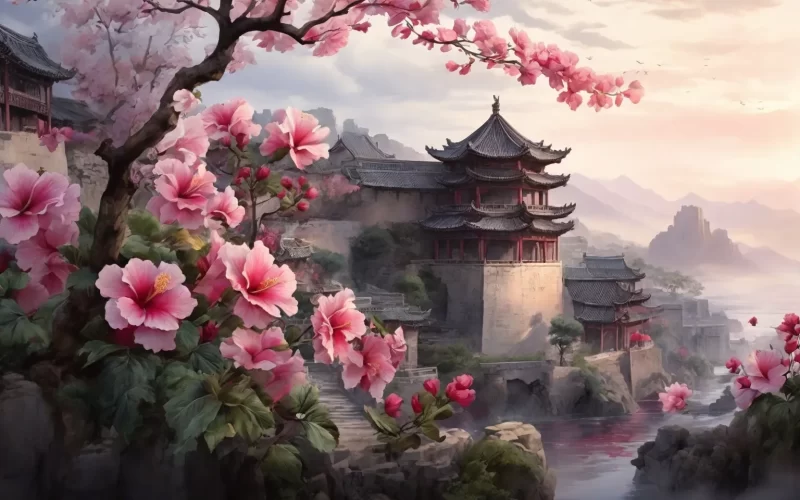A hundred mountains and no bird,
A thousand paths without a footprint;
A little boat, a bamboo cloak,
An old man fishing in the cold river-snow.
Original Poem
「江雪」
柳宗元
千山鸟飞绝,万径人踪灭。
孤舟蓑笠翁,独钓寒江雪。
Interpretation
Composed during the Yuanhe era of Emperor Xianzong's reign, this poem was written when Liu Zongyuan, having supported the failed Yongzhen Reforms, was exiled to serve as Sima of Yongzhou. With political ideals shattered in this desolate frontier, the poem uses the imagery of fishing in snow to express the poet's solitary yet resilient spiritual state.
First Couplet: "千山鸟飞绝,万径人踪灭。"
Qiān shān niǎo fēi jué, wàn jìng rén zōng miè.
Across a thousand mountains - no birds in flight / On ten thousand paths - no human trace in sight
The opening creates a world of absolute stillness through snowscape imagery. The numbers "thousand" and "ten thousand" (used hyperbolically) intensify visual tension, immersing readers in a closed, desolate, frozen universe. "No birds"/"no human trace" transcends literal description to symbolize the poet's political isolation and existential alienation. This extreme emptiness mirrors his inner reality after exile—not just physically banished but spiritually abandoned by the world.
Second Couplet: "孤舟蓑笠翁,独钓寒江雪。"
Gū zhōu suō lì wēng, dú diào hán jiāng xuě.
A lone boat, straw-cloaked old man / Fishing alone in cold river's snowspan
The focus narrows from panorama to intimate portrait. The straw raincoat and bamboo hat—traditional symbols of reclusion—construct an idealized self-image: transcendent and aloof. The fishing activity becomes philosophical meditation rather than practical pursuit, embodying Zhuangzi's ideal of "communing alone with the universe's spirit." This is spiritual discipline against loneliness and cold—a quiet resistance through steadfastness.
Holistic Appreciation
With minimalist strokes conveying profound meaning, the poem first establishes a vast, lifeless backdrop, then injects soul through the fisherman's image. Without direct emotional expression, every line resonates with feeling, achieving perfect scene-emotion fusion. More than an ethereal landscape painting, it's a psychological sketch of Liu's exiled mind: solitary yet steadfast, silent yet noble. The fishing stillness, river's cold, and sky's emptiness all mirror the poet's inner clarity and fortitude.
Artistic Merits
- Architectural Symmetry: Contrasting couplets (virtual/actual scenes) flow seamlessly
- Symbolic Portraiture: The fisherman transcends nature to become spiritual avatar
- Philosophical Depth: Fishing represents mental purification and detachment
- Precision Craftsmanship: Each character polished, imagery stark yet evocative
Insights
The poem transmits not just the poet's unyielding integrity in adversity, but also the power of solitude—"alone yet not lonely, still yet undiminished." In our chaotic world, maintaining inner clarity resembles the old fisherman's calm persistence against winter's wrath. This transcendent resilience, spanning millennia, still enlightens modern readers: true wisdom and courage lie in keeping one's essence amid turmoil, like a steady boat in snowy currents.
Poem translator
Kiang Kanghu
About the poet

Liu Zongyuan (柳宗元), 773-819 A.D., a native of Yongji, Shanxi, was a progressive thinker, brilliant writer, and revolutionary statesman of the Tang Dynasty. Nineteen years before he was born, the An Shi Rebellion broke out, which dramatically changed the Tang Dynasty from prosperity to decline. The subsequent failure of the Yongzhen Reform was a historical tragedy that cut short Liu Zongyuan's political future, but made him one of the leading thinkers and literary figures of the Tang Dynasty.











